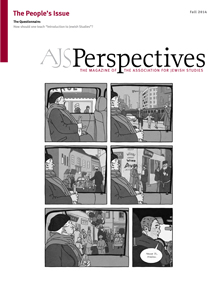Dear Colleagues,
The 350th anniversary of the British capture of New Amsterdam (promptly renamed New York), passed without official commemoration, The New York Times reported on August 25, 2014. It cited "ambivalence toward the British and a dispassion for the past" as the chief reasons behind the "nearly unanimous indifference" toward the anniversary. Professor Mike Wallace of City University, who wrote a history of early New York, explained that lowering a Dutch flag and raising a British one "doesn't set the pulse-a-pounding."
Having myself been involved in commemorating quite a number of historical anniversaries—the one hundredth anniversary of the Combined Jewish Philanthropies of Greater Boston, the 350th anniversary of American Jewish life, and most recently the 150th anniversary of Ulysses S. Grant's Civil War order expelling Jews from his war zone—I question whether the metric of "set the pulse-a-pounding" is the right one to employ. Perhaps the popularity of military anniversaries (the 200th anniversary of the War of 1812, the 150th anniversary of the Civil War, the 100th anniversary of World War I, etc.) may be attributed to racing pulses, but the 850th anniversary of the birth of Moses Maimonides (commemorated around the world in 1985), the 900th anniversary of Rashi's death (in 2005), or this year's twentieth yahrzeit of the Lubavitcher Rebbe?
All of the commemorations in which I have been involved have entailed instead well-planned efforts to arouse interest in events that otherwise might not have gained any notice at all. Anniversary celebrations—historical or personal—do not happen by themselves. That's why we have already begun thinking about how to celebrate the fiftieth anniversary of the Association for Jewish Studies, to be commemorated in 2018–19—stay tuned! My guess is that what really distinguished the celebration of the 350th anniversary of American Jewish life from the 350th anniversary of the British capture of New Amsterdam is that far-sighted communal leaders made a conscious effort to promote educational, scholarly, and cultural events relating to the anniversary of the Jews' arrival, while nobody, it seems, sought similarly to exploit the anniversary of the arrival of the British.
Why might this be significant to those reading this issue devoted to grass-roots perspectives on Jewish texts and history? It seems to me that anniversaries—maybe even the anniversary of AJS—can serve as an effective tool for exciting grassroots interest in our work and for forging ties between the larger public and the community of scholars. Each of the anniversary commemorations in which I have been involved engaged both scholars and lay representatives, and in all cases the lay nonprofessionals expressed pleasure at the opportunity to engage with scholarly materials ("it's as if we were back at university," one happily exclaimed.) Scholars also have much to learn from lay enthusiasts. In my forthcoming book, Abraham Lincoln and the Jews: A History, which I wrote with a celebrated collector of Lincoln materials to mark the 150th anniversary of Lincoln's assassination, I certainly learned as much from my collaborator as he did from me.
Admittedly, anniversaries are somewhat arbitrary and, as Maoz Azaryahu has shown in his illuminating study of successive celebrations of Tel Aviv's birthday, they almost inevitably evince "specific political priorities, ideological agendas, economic interests, and cultural conventions." But, remembering that no history is truly dispassionate, we might also note that anniversaries promote historical consciousness, stimulate interest and inquiry, and, in the best of cases, inspire creativity, renewal, and reassessment. That was certainly true of the recent commemoration of Tel Aviv's centennial, and one can think of many similar examples as well.
Scholars of music have long appreciated the power of the anniversary. "The Beethoven anniversaries, involving among others, Liszt and Schumann, were important moments in nineteenth-century music history," Leon Botstein reports. "The 1909 Haydn centennial was a turning point in the evolution of Haydn scholarship. . . . The list of such important anniversaries is a map of the evolution of our historical consciousness." As early as 1928, the Musical Times praised anniversary celebrations for their contribution to "the initiation and development of the historical sense, the stimulation of music-making, and the enlargement of repertoires." More recently, in 1997, scholars of music simultaneously commemorated the bicentennial of Schubert's birth, the 150th anniversary of Felix Mendelssohn's death, and a hundred years since the passing of Brahms.
Botstein, to be sure, argued back in 1997, that "our scholarly and concert agendas need to find some other impetus than anniversaries." In Jewish Studies too (and especially at AJS), an exclusive focus on anniversaries would unquestionably impoverish scholarship. But if our goal is to embrace "the people" in the work that we do, then paying close attention to anniversaries as opportunities for forging wider communal ties and engaging the larger public in our work surely makes sense. Experience suggests that when scholars fail to mark the anniversaries of milestones from our past—like the 1664 capture of New Amsterdam—the significance of those milestones can easily be forgotten.
Jonathan D. Sarna
Brandeis University

